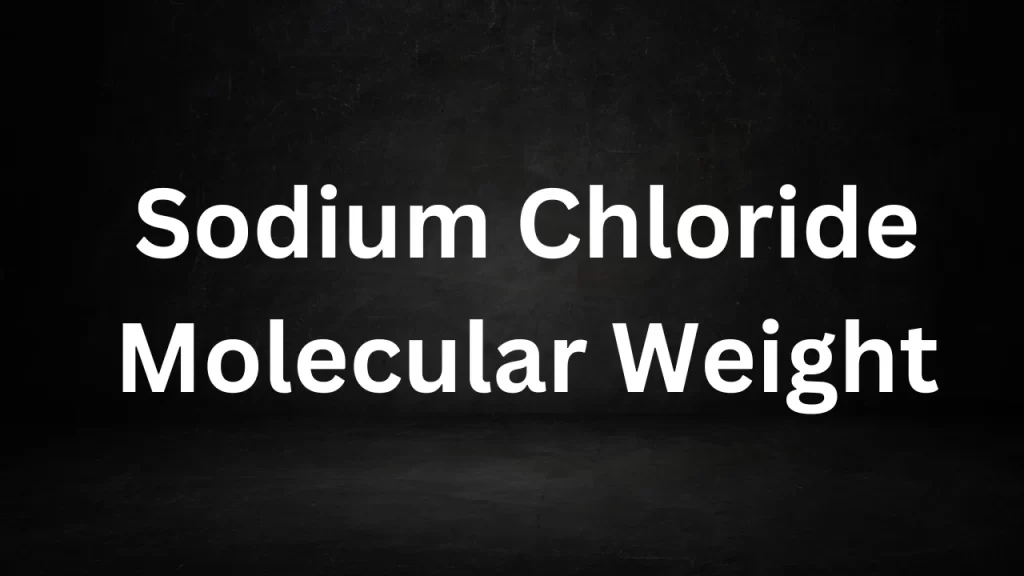Sodium Chloride Molecular Weight
Sodium Chloride Molecular Weight: Sodium chloride, commonly known as table salt, is a ubiquitous and essential compound in our daily lives. While it enhances the flavor of our food, it also plays a crucial role in various industries and scientific endeavors.
One fundamental aspect of sodium chloride is its molecular weight, which is a key factor in understanding its properties and applications. In this article, we will explore the molecular weight of sodium chloride and its significance in different fields.

Sodium Chloride Molecular Weight
The Composition of Sodium Chloride
Sodium chloride (NaCl) is a chemical compound composed of two elements: sodium (Na) and chlorine (Cl). It is an ionic compound held together by electrostatic forces due to the transfer of an electron from sodium to chlorine, resulting in the formation of positively charged sodium ions (Na+) and negatively charged chloride ions (Cl-).
Calculating the Molecular Weight
To determine the mole weight of sodium chloride (NaCl), we need to consider the atomic masses of sodium and chlorine. Sodium (Na) has an atomic mass of approximately 22.98977 atomic mass units (amu), while chlorine (Cl) has about 35.453 amu.
The molar mass, also called the mole weight or molar weight, of sodium chloride is determined by summing the atomic masses of its component elements.
Molecular Weight of NaCl = Atomic Mass of Na + Atomic Mass of Cl Molecular Weight of NaCl ≈ 22.98977 amu + 35.453 amu Molecular Weight of NaCl ≈ 58.44277 amu
Hence, sodium chloride (NaCl) has a molar mass of about 58.44277 atomic mass units (amu) or 58.44277 grams per mole (g/mol).
Significance of Sodium Chloride’s Molecular Weight
- Chemical Reactions: The mole weight of sodium chloride is crucial in various chemical reactions, especially in stoichiometry, where it helps determine the reactant ratios and the amount of product produced.
- Industrial Applications: In industries such as food processing, pharmaceuticals, and water treatment, knowing the mole weight of sodium chloride is vital for precise measurements and formulations.
- Health and Nutrition: Sodium chloride is a vital dietary component, and knowledge of its molecular weight aids dietary calculations, particularly for those with restrictions.
- Analytical Chemistry: In analytical chemistry, sodium chloride’s molecular weight is utilized, particularly in titration, as a primary standard for solution standardization.
- Salt in Solutions: The molar mass of sodium chloride is crucial for comprehending colligative properties in solutions, relevant in science and industry.
Conclusion
Sodium chloride, with its precise mole weight of approximately 58.44277 amu, significantly impacts chemistry, industry, and daily living. Its mole weight is a key factor in chemical reactions, industrial processes, dietary considerations, and analytical techniques. From seasoning meals to advancing science, sodium chloride’s molecular weight plays a vital role in various aspects of our world.
Read More
- Equivalent Weight Of CaCO3
- Benzoic Acid Molar Mass
- Sulfuric Acid Molar Mass
- Discrete Mathematics For Computer Science
- Molecular Mass of Carbon Dioxide
Frequently Asked Questions (FAQs) On Sodium Chloride Molecular Weight
1. What is sodium chloride?
Sodium chloride (NaCl) is a chemical compound commonly known as table salt. It is composed of sodium (Na) and chlorine (Cl) ions.
2. What is the molecular weight of sodium chloride?
The mole weight of sodium chloride (NaCl) is approximately 58.44277 atomic mass units (amu) or 58.44277 grams per mole (g/mol).
3. How is the molecular weight of sodium chloride calculated?
To calculate the mole weight of sodium chloride, you add the atomic masses of its constituent elements, sodium (Na) and chlorine (Cl).
4. Why is knowing the molecular weight of sodium chloride important in chemistry?
Sodium chloride’s molecular weight is essential for stoichiometry, determining reactant ratios, and understanding chemical reactions. It is also crucial in various industries and scientific fields.
5. In which industries is the knowledge of sodium chloride’s molecular weight significant?
Sodium chloride’s molecular weight is crucial in industries like food processing, pharmaceuticals, water treatment, and chemical manufacturing, requiring precision.